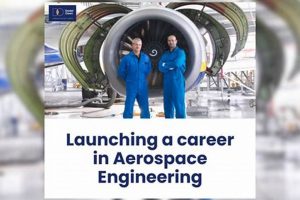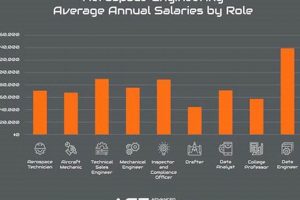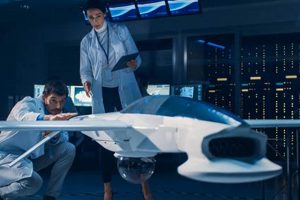Positions within the aerospace sector requiring a Master of Science degree are increasingly prevalent. These roles typically demand advanced technical skills and specialized knowledge in areas such as aerodynamics, propulsion, and materials science. An example includes a Senior Propulsion Engineer position at a leading aerospace manufacturer.
Securing a position at this level often translates to greater responsibility, increased earning potential, and the opportunity to contribute to cutting-edge research and development. Historically, advanced degrees were less emphasized, but the growing complexity of aerospace technology has led to a heightened demand for individuals with postgraduate qualifications and expertise.
The subsequent discussion will address specific areas within the aerospace field where these advanced degrees are highly valued, as well as the necessary qualifications and potential career paths for those holding such degrees.
The following recommendations are intended to assist individuals in pursuing career advancement within the aerospace sector, specifically for roles that benefit from or require a Master of Science degree.
Tip 1: Cultivate a highly specialized skillset. A general engineering background is insufficient. Focus on a niche area such as computational fluid dynamics, advanced materials, or space systems engineering. Demonstrate expertise through targeted coursework and research.
Tip 2: Prioritize internships and research experiences. Employers highly value practical application of theoretical knowledge. Seek opportunities at aerospace companies, government research laboratories (e.g., NASA), or universities with strong aerospace programs.
Tip 3: Develop strong communication and presentation skills. The ability to articulate complex technical concepts clearly and concisely is crucial for collaboration and project leadership. Participate in conferences, publish research findings, and practice presenting to diverse audiences.
Tip 4: Acquire relevant certifications. Specific certifications, such as those related to project management or quality control, can enhance marketability and demonstrate commitment to professional development. Research industry-recognized certifications that align with desired career paths.
Tip 5: Network strategically. Attend industry events, join professional organizations (e.g., AIAA), and connect with professionals on platforms like LinkedIn. Building relationships can provide valuable insights, mentorship, and potential job leads.
Tip 6: Tailor applications to specific roles. Avoid generic resumes and cover letters. Highlight relevant skills, experiences, and achievements that directly address the requirements of each position. Research the company and demonstrate a clear understanding of its mission and values.
Tip 7: Consider pursuing a doctorate. For individuals interested in research-intensive roles or academic positions, a PhD can significantly expand career opportunities. Evaluate long-term career goals and assess the value of a doctoral degree in achieving them.
These strategies can significantly enhance an individual’s prospects within the competitive aerospace labor market. Successful navigation of this field requires a combination of advanced technical expertise, practical experience, and professional networking.
The subsequent section will delve into specific job titles and responsibilities associated with positions within the aerospace sector that leverage a Master of Science degree.
1. Specialized Technical Knowledge
The attainment of a Master of Science (MS) degree is often a direct precursor to securing specialized roles within the aerospace industry. The curriculum associated with these advanced programs is designed to impart highly focused technical expertise in areas critical to aerospace engineering. The causality is clear: demand for aerospace professionals with concentrated skill sets drives the requirement for advanced degrees, and the possession of specialized knowledge increases one’s eligibility for such roles. For instance, an MS-level engineer specializing in composite materials may lead research and development efforts for next-generation aircraft wings. Specialized technical expertise constitutes an essential component of eligibility for these roles; without it, individuals are unlikely to compete effectively for positions requiring in-depth understanding of complex systems and technologies.
The practical significance of this understanding lies in guiding career planning. Aspiring aerospace professionals must identify specific areas of interest and develop targeted expertise through graduate-level coursework and research. For example, an MS in Aerodynamics would equip an individual to work on projects related to aircraft design and testing, while an MS in Propulsion might lead to a career in designing and optimizing rocket engines. The concentration of specialized knowledge enables a transition from a general engineering background to a highly sought-after expertise. This expertise provides valuable context into project requirements in the aerospace industry.
In summary, the connection between specialized technical knowledge and roles requiring an MS degree in aerospace is one of direct dependency. The increasingly complex nature of aerospace engineering necessitates in-depth expertise in specific areas. Challenges include keeping pace with rapidly evolving technologies and selecting a specialization that aligns with both personal interests and industry demand. However, strategic planning, targeted education, and continuous learning are key to leveraging specialized knowledge and excelling in demanding and competitive roles in the field.
2. Research and Development
Research and development (R&D) is a cornerstone of the aerospace industry, directly impacting the demand for advanced degrees. A Master of Science is often a prerequisite for participation in R&D initiatives within this sector. These positions drive innovation and ensure the industry’s continued advancement.
- Design and Testing of New Technologies
Positions in R&D are directly concerned with creating novel technologies to improve aerospace systems. This involves designing, prototyping, and rigorously testing new materials, propulsion systems, and avionics. For example, engineers holding an MS degree may contribute to the development of more efficient jet engines that reduce fuel consumption and emissions. The implication for those seeking “ms aerospace jobs” is a need for expertise in simulation, modeling, and experimental validation techniques.
- Scientific Experimentation and Data Analysis
R&D frequently involves conducting experiments to validate theoretical models and collect data for analysis. This data informs design decisions and ensures the reliability of new aerospace technologies. As an instance, scientists may analyze data from wind tunnel tests to optimize the aerodynamic performance of aircraft. Candidates pursuing “ms aerospace jobs” must possess a strong foundation in statistical analysis and scientific methodologies.
- Conceptualization and Innovation
A core component of R&D is the ability to conceptualize and develop innovative solutions to complex aerospace problems. This requires creativity, critical thinking, and a thorough understanding of the industry’s challenges. An example is the design of autonomous flight control systems for unmanned aerial vehicles. For “ms aerospace jobs”, innovation is highly sought after, and demonstrated creativity is a key advantage.
- Collaboration and Communication
R&D activities are inherently collaborative, often involving teams of engineers and scientists with diverse expertise. Effective communication is essential for sharing findings, coordinating efforts, and overcoming technical challenges. Consider a project requiring multiple teams to coordinate on designing an aircraft wing structure. Individuals in “ms aerospace jobs” need to effectively communicate across disciplines to be successful in innovative projects.
These facets of R&D emphasize the significance of a Master of Science degree in securing positions within the aerospace industry. R&D projects, from the basic design of new technologies to the data analysis and reporting process, all require a high level of education and understanding. The industrys increasing demand for innovation ensures that advanced degrees, such as an MS, will continue to be highly valued in these specialized functions.
3. Project Management Skills
Project management skills represent a crucial dimension within advanced aerospace roles typically pursued by individuals holding a Master of Science (MS) degree. The inherent complexity and scale of aerospace projects necessitate adept coordination, resource allocation, and risk mitigation. The absence of robust project management capabilities can lead to cost overruns, schedule delays, and compromised system performance. For instance, the development of a new satellite constellation demands intricate management of multiple contractors, suppliers, and engineering teams, underscoring the direct link between project management proficiency and successful project execution in roles targeting “ms aerospace jobs.” Understanding this connection is vital for aspiring candidates to prioritize project management training and experience alongside their technical expertise. Effective project management ensures projects are completed to the agreed timeline, budget and quality goals.
The practical application of these skills is evident in various aspects of “ms aerospace jobs.” Aerospace engineers with an MS are frequently tasked with leading teams in the design, development, and testing of complex systems. Examples include managing the integration of new avionics systems into existing aircraft, overseeing the construction of advanced composite structures, or coordinating the deployment of space-based assets. These responsibilities require a comprehensive understanding of project management methodologies, such as Agile or Waterfall, as well as proficiency in project management software tools. Furthermore, effective communication, leadership, and problem-solving abilities are essential for navigating the challenges inherent in large-scale aerospace projects. The ability to clearly communicate technical information to non-technical stakeholders is often important, and project managers in the aerospace industry are often required to act as both a technical and business leader.
In summary, project management skills are inextricably linked to success in “ms aerospace jobs.” These capabilities are not merely supplementary but are integral to ensuring the efficient and effective execution of complex aerospace projects. While technical expertise remains paramount, the ability to manage resources, mitigate risks, and lead teams is equally crucial for individuals seeking to excel in advanced aerospace roles. Future challenges will likely involve managing projects that increasingly rely on global collaboration and complex supply chains. Individuals who prioritize the development of their project management skills will be well-positioned to thrive in the dynamic and demanding environment of the aerospace industry.
4. Regulatory Compliance Expertise
Regulatory compliance expertise constitutes a critical component of advanced aerospace roles, particularly those targeted by individuals possessing a Master of Science (MS) degree. The aerospace sector is subject to stringent regulations and standards imposed by governmental bodies and international organizations. A comprehensive understanding of these regulations is essential for ensuring the safety, reliability, and environmental sustainability of aerospace systems.
- FAA and International Standards Adherence
Compliance with Federal Aviation Administration (FAA) regulations in the United States and equivalent international standards, such as those established by the European Aviation Safety Agency (EASA), is paramount. This includes adherence to airworthiness standards, operational requirements, and maintenance procedures. An MS-level engineer might be responsible for ensuring that a new aircraft design meets all applicable FAA safety regulations. Failure to comply can result in significant penalties, including fines, grounding of aircraft, and reputational damage.
- Environmental Regulations Compliance
The aerospace industry faces increasing scrutiny regarding its environmental impact. Expertise in regulations related to emissions, noise pollution, and the use of hazardous materials is increasingly valuable. For example, an engineer might be tasked with developing and implementing strategies to reduce the carbon footprint of aircraft operations, such as by utilizing sustainable aviation fuels or designing more fuel-efficient engines. Non-compliance can lead to legal action and damage to the company’s public image.
- Export Control and Security Regulations
Aerospace technology is often subject to export control regulations due to its potential military applications. A thorough understanding of these regulations, such as the International Traffic in Arms Regulations (ITAR) in the United States, is crucial for ensuring compliance when exporting aerospace products or technologies. An MS-level engineer might be involved in ensuring that technical data is properly protected and that all necessary export licenses are obtained. Violations can result in severe penalties, including criminal prosecution.
- Safety Management Systems (SMS) Implementation
Many aerospace organizations are required to implement Safety Management Systems (SMS) to proactively identify and mitigate safety hazards. SMS involves establishing procedures for hazard reporting, risk assessment, and incident investigation. An MS-level engineer might be responsible for developing and implementing SMS procedures within a specific department or project. Effective SMS implementation is essential for preventing accidents and ensuring the safety of passengers and personnel.
The demand for regulatory compliance expertise in “ms aerospace jobs” reflects the increasingly complex and highly regulated nature of the aerospace industry. These roles demand a high level of education, understanding, and leadership. Individuals who possess both technical expertise and a deep understanding of regulatory requirements are highly sought after and play a critical role in ensuring the safety, sustainability, and security of aerospace operations.
5. Advanced Problem Solving
Advanced problem-solving skills are fundamentally linked to roles within the aerospace sector that typically necessitate a Master of Science (MS) degree. The aerospace industry is characterized by complex systems, intricate designs, and exacting performance requirements. These conditions frequently present challenges demanding innovative and sophisticated solutions. The cause-and-effect relationship is evident: the inherent complexity of aerospace engineering necessitates advanced problem-solving abilities, which in turn, are fostered and refined through advanced education, leading to the requirement for an MS degree for numerous positions. As an example, the development of a new hypersonic vehicle involves overcoming significant aerodynamic, thermal, and structural challenges, requiring engineers to apply advanced analytical techniques and creative problem-solving approaches. The presence of these skills contributes directly to the successful resolution of unforeseen technical obstacles. Without this expertise, development timelines will lag and errors will be made.
The importance of advanced problem-solving as a component of “ms aerospace jobs” is underscored by its practical application across various disciplines. For instance, in the field of propulsion, engineers may encounter instability issues in rocket engine combustion. Resolving this requires a deep understanding of fluid dynamics, thermodynamics, and control systems, along with the ability to analyze complex data and develop innovative solutions. Similarly, in structural engineering, addressing the challenges of designing lightweight yet robust aircraft structures demands advanced knowledge of materials science, finite element analysis, and fracture mechanics. A problem like this could require an engineer to work to tight tolerances, and the failure of a design to meet requirements could have catastrophic consequences. The practical significance of this understanding lies in its ability to guide curriculum development and professional training programs, ensuring that aerospace engineers are equipped with the skills necessary to address the industry’s most pressing challenges.
In conclusion, advanced problem-solving abilities are not merely desirable but are essential for individuals seeking “ms aerospace jobs.” These skills are cultivated through advanced education and honed through practical experience, enabling engineers to tackle the complex and multifaceted challenges inherent in the aerospace sector. Future challenges will likely involve integrating artificial intelligence and machine learning into aerospace systems, requiring even more sophisticated problem-solving approaches. The commitment to fostering and developing these skills will be critical for ensuring the continued innovation and advancement of the aerospace industry. The ability to use creative skills to solve problems is a major contributor to the success of large projects in the aerospace industry.
Frequently Asked Questions
The following addresses common inquiries regarding career paths and requirements for positions within the aerospace sector that typically benefit from or require a Master of Science degree.
Question 1: What specific technical skills are most valuable for pursuing a career in aerospace with an MS degree?
Expertise in areas such as computational fluid dynamics, advanced materials science, propulsion systems, and control systems is highly valued. A strong foundation in mathematics, physics, and computer programming is also essential.
Question 2: How does a Master of Science degree differentiate an applicant from those with only a Bachelor of Science degree in the aerospace field?
An MS degree demonstrates a deeper understanding of specialized topics, enhanced research capabilities, and a greater capacity for independent problem-solving. This often leads to increased responsibilities and opportunities for advancement.
Question 3: What types of research opportunities are available to individuals with an MS degree in aerospace?
Research opportunities may include designing and testing new aircraft components, developing advanced propulsion systems, studying the effects of space radiation on materials, and creating innovative control algorithms for unmanned aerial vehicles.
Question 4: What career paths are typically available to individuals with an MS degree in aerospace besides engineering roles?
An MS degree can also lead to careers in research, management, consulting, and government agencies. These roles often involve applying technical knowledge to solve complex problems and inform strategic decisions.
Question 5: How important is industry experience, such as internships, when seeking aerospace positions with an MS degree?
Industry experience is highly valued and can significantly enhance an applicant’s competitiveness. Internships provide practical application of theoretical knowledge and exposure to real-world challenges.
Question 6: What are the typical salary expectations for individuals with an MS degree in aerospace, compared to those with only a BS degree?
While salaries vary based on experience, location, and specific role, individuals with an MS degree generally command higher salaries due to their advanced skills and knowledge. Researching industry salary surveys can provide specific data.
In summary, a Master of Science degree offers a significant advantage for individuals seeking advanced roles within the aerospace industry. Focused skill development, practical experience, and strategic career planning are essential for maximizing opportunities.
The subsequent section will discuss the future outlook for careers in aerospace that require or benefit from a Master of Science degree.
MS Aerospace Jobs
This exploration has detailed the multifaceted nature of positions within the aerospace sector attainable with a Master of Science degree. Key aspects discussed include the necessity for specialized technical knowledge, the importance of contributions to research and development initiatives, the value of project management skills, the requirement for regulatory compliance expertise, and the reliance on advanced problem-solving capabilities. It is apparent that these positions represent a critical component of the aerospace industry’s ongoing innovation and technological advancement.
Given the increasing complexity of aerospace systems and the industry’s continued growth, roles requiring advanced education and specialized skills will remain in high demand. Individuals seeking to contribute to this dynamic field should prioritize the acquisition of relevant technical expertise, practical experience, and a commitment to lifelong learning. The pursuit of such qualifications is essential for securing a meaningful and impactful career within the evolving landscape of aerospace engineering.







